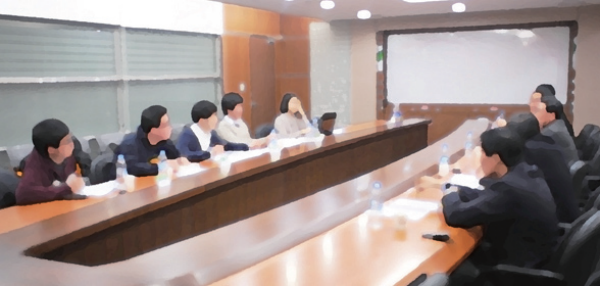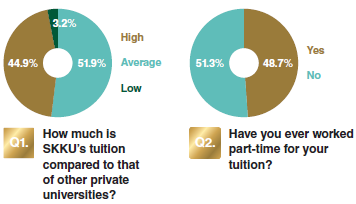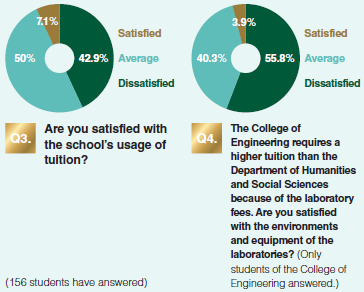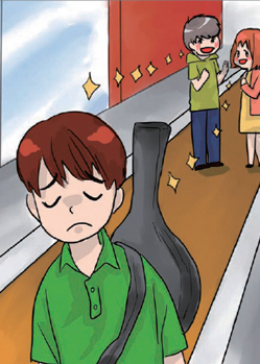According to a survey conducted by the Korea Student Aid Foundation (KOSAF) in 2017, the average monthly cost of living for a university student is more than 700,000. Many students work and study at the same time due to the excessive pressure of expensive tuition. Reflecting Kingos’ opinions, the student council S:with held six tuition committee meetings with the school within a month during the vacation, in order to try to reduce tuition. Many Kingos might be curious as to the reasons for expensive tuition and the changes they could face after the tuition committee meetings and the abolishment of the admission fee policy. The Sungkyun Times (SKT) now analyzes students’ awareness of the tuition and its usage, examines the controversy over tuition, and discusses some practical solutions.
Awareness of Tuition and the Reality
How Appropriately is SKKU Tuition Used?

Although the tuition of SKKU might seem high taking the total figures into account, it does not differ much from those of other private universities. According to research by the Korean Educational Development Institute (KEDI), the average tuition of four-year private universities is 773,300 for admission fees and 7,332,900 for tuition, which is higher than those of SKKU. SKKU’s tuition is even lower than that of other private universities such as Yonsei University, Korea University or Sogang University, according to 2017 figures from Higher Education in Korea (HEIK). Student welfare is one of the major usages of tuition at SKKU. SKKU has an excellent educational environment, which includes support for educational expenses or the security of many full-time faculty members. According to a survey conducted by HEIK in 2017, educational expenses of SKKU per capita cost about 2.6 million, ranking third among the top 17 universities. The ratio of students per one full-time faculty member and the securement rate of a full-time faculty member are 17.9 and 118.6% respectively, which is at the highest level among major private universities.

SKKU also has a low level of tuition dependency. SKKU’s tuition dependency is 47.7%, ranked second among universities who have a low tuition dependency. The share ratio that the school foundation should bear reached 100% for three consecutive years until 2016, and it is the only case of a private university reaching 100%. The share includes four major insurance costs and employee severance payments that the private university foundation should bear as an employer. While many private universities fill that share with tuition, SKKU is able to allocate more budget on students from tuition thanks to the 100% payment from the school foundation.

The Stance of Kingos and SKKU About Tuition
After six tuition committee meetings, the school announced that they would freeze, and strive to provide more scholarships. They added that they did not raise the tuition despite internal and external financial issues, such as the minimum-wage increase, a reduction of admission fees and test fees, and a decrease in the number of students. According to the 2017 Jungang Ilbo University Evaluation, SKKU’s scholarship benefits compared to its tuition came in second place at 3.45 million per student. Unlike external statistics, however, students feel that tuition is expensive considering their housing and living costs. The school claims that the scholarship benefits are more than enough, but in fact, the scholarships are only given to a limited number of students. Scholarships that are given to students who work in the school as their wages also make the scholarship figures higher than they actually are.
Kingos’ Awareness of Tuition


More than half of the respondents had negative perceptions of tuition and the way it is spent. It turns out that students in the College of Engineering are dissatisfied with the lab environments and equipment even though they pay higher tuition due to laboratory fees. In addition, it is known that students of the School of Art are dissatisfied with their practical training environment, which raises their tuition as well.
Controversy over SKKU’s Tuition
Getting a substantial reduction in tuition through tuition committee meetings might be difficult, but Kingos can still ask for feedback on various issues related to tuition. Therefore, it is necessary for Kingos to understand the controversies over SKKU’s tuition.
Admission Fee Abolishment: A Burden Kingos Would Take
Admissions fees are the money that students should pay when they enroll in university. The Higher Education Act states that universities can incorporate tuition and other fees into the admission fees. As the usage of admission fees is somewhat unclear and the burden on students is growing, the government has lately enforced a policy to abolish admission fees. Following the policy, SKKU will reduce its admission fee by up to 80%, starting from this year by 16% each year (except for the real cost of admission fee) until 2022. Until the end of the reduction phase, the government will support the actual cost of the admission fee as a National Grant Type II. After 2022, however, it will be charged as a freshman’s tuition fee but supported with a scholarship equivalent to that amount. Cutting down the admission fee by about 80%, the university will see a reduction of 3.5 billion in its income. If SKKU does not agree to the policy, however, it may be disqualified or deducted through the project of the National Grant Type II and other linked state-funded projects. Reduced income will give disadvantages to undergraduate students because the school has no choice but to allocate less money for students, considering that the school budget is set up by combining tuition and admission fees.
Gaps Between Tuition Fees of Each Department

The Department of Natural Sciences has a higher tuition than that of the Department
of Humanities and Social Sciences. The Department of Engineering and the Department of Arts and Physical Education also have higher tuition fees than other departments because of their practice and equipment fees. Unlike other private universities where tuition fees between each department do not differ much, the tuition fees of the Department of Engineering and the School of Art at SKKU ranking show a huge difference with other departments in SKKU. The tuition of the Department of Humanities and Social Sciences is approximately 1.58 million less than the Department of Engineering, and about 1.31 million less than the Department of Arts. The details of actual usage of practice fees, which are estimated by the differences in tuition, are not specified, and the experimental environment is poor as well.
Moreover, there is a related controversy over additional tuition fees at the College of Biotechnology and Bioengineering. If students from the Department of Natural Sciences pick majors from the College of Science, they are charged 4 million for tuition per semester, which is same as their freshman year tuition. When they pick majors from the College of Biotechnology and Bioengineering, however, they have to pay an additional 500,000. In 2017, the student council of the College of Biotechnology and Bioengineering raised the question, “Isn’t it right for the tuition of the College of Biotechnology and Bioengineering to be treated the same as the College of Science since the students are all from the same department, the Department of Natural Science?” It was sent to the Office of Planning and Coordination, and the office answered “Since freshmen of the Department of Natural Science are not assigned to a specific college, they are charged the tuition of the College of Science, which is lower than that of the College of Biotechnology and Bioengineering.” The cost of laboratory fees is the same for each college of science, so the reason for an extra 500,000 for tuition is still unclear.
Practical Ways to Solve Problems of Tuition
Reflecting Students’ Opinions in Tuition Appropriation
One possible solution is to upgrade the tuition fee committee to a resolution organization of tuition. The committee is meaningful in that it mandatorily ensures the annual involvement of the student body in the appropriation of tuition. In tuition committee meetings, however, students have limited influence as they have no voting rights. Once a fixed proportion of students are included on the Board of Directors which has the authority to assign tuition, their voices will be actively reflected. For instance, the state government of Wisconsin, United States (US) has already implemented policies to ensure students’ voting rights in the process of appropriating tuition. According to the state constitution of Wisconsin, the proportion of the university budget is fixed as 65% for the state and 35% for the students. Though the board of directors of universities has the authority to organize their budget, they must get agreement from the governor and state council as well.
Transparent Tuition Fee Usage Notifications
It is necessary to create a new organization to discuss and reveal tuition fee usage at SKKU. The organization should identify policies to implement each year after a mutual consultation between the school and the students. Further, it would enable students to view the usage of tuition transparently and monitor the school’s policies, allowing the school to make students understand the appropriate level of tuition better. In this sense, the details of tuition usage will be reported so that students can clearly see where the additional tuition such as practice fees are spent. For example, Seoul National University is planning to create a task force that reveals the standards of the proposed tuition of each department, which will be the first to do so in Korea.
Given that SKKU’s scholarship benefits compared to its tuiton is high, the school argues that they are returning the tuition as much as students pay. If students, however, have to work and study at the same time to afford their tuition, they might not be able to concentrate fully on studying. The school will need to continuously discuss affordable tuition with the students and reflect their opinions on the final decision.
